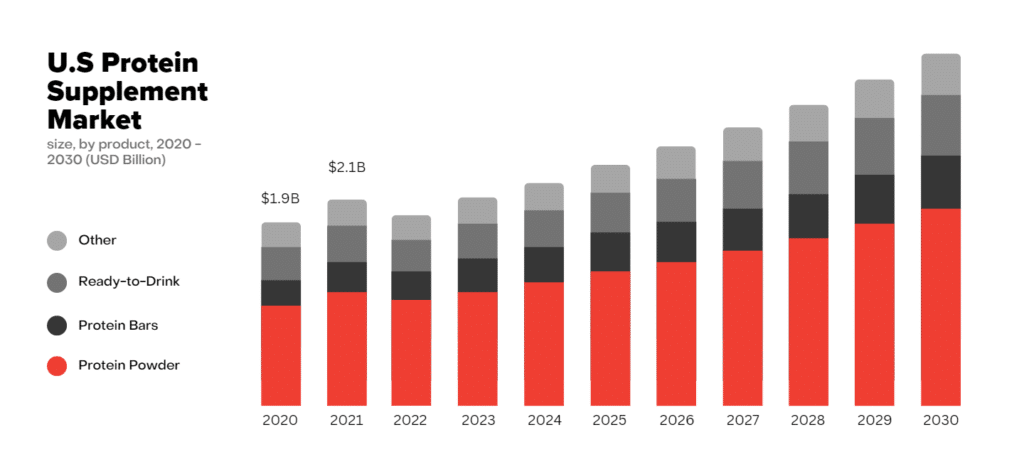Protein supplements are gaining immense popularity worldwide, not just among professional athletes but also among a broader range of consumers who recognize their incredible benefits for sports nutrition, muscle building, and overall health. However, the traditional animal and plant-based protein options have limitations, necessitating the search for innovative alternatives. One such exciting product is yeast protein.
Protein has been shown to have numerous positive effects, including:
- Weight management,
- muscle building,
- tissue recovery,
- strength gains, and
- improved body composition.
These benefits have propelled the supplement market to a staggering value of $6.3 billion in 2021, with further growth projected in the coming years.

The global protein supplements market was valued at USD 6.26 billion in 2021 and is expected to expand at a compound annual growth rate (CAGR) of 8.0% from 2022 to 2030. The market is gaining momentum owing to the increasing number of health-conscious consumers and fitness centres around the globe.
The need for new protein sources
Our planet is facing a significant challenge in meeting the growing global demand for protein. Over the past two decades, protein consumption has been on the rise, and this trend is expected to continue as the population grows and economies thrive. However, relying solely on traditional animal agriculture to meet this demand poses a problem. In light of this concern, both companies and consumers are now turning their attention to yeast protein as a promising and sustainable solution.
Protein supplements come from various sources such as whey, casein, beef, fish, egg, soy, pea, hemp, and rice. Animal proteins, like whey, are often considered superior to plant-based options due to their rich content of essential amino acids. Moreover, plant-based proteins may not be as easily digested in the gut and can negatively affect metabolism and immune response.
Whey protein, derived from milk during cheese production, has long been regarded as the gold standard. It is a complete protein that is quickly digested and contains high levels of branched-chain amino acids (BCAAs) and leucine, which are crucial for muscle growth and recovery.
However, using animal sources in whey protein presents a significant barrier for many consumers. Environmental concerns, animal welfare issues, and contamination fears have prompted a global shift towards reducing animal product consumption. For instance, nearly half of the population in Singapore has already reduced or eliminated animal products from their diets. Similar trends are observed in other Asian countries, where many individuals opt for meat reduction. As a result, there is a growing demand for alternatives.
Challenges with plant-based proteins
Plant-based proteins have gained popularity as an alternative but still have limitations. They often lack the same amino acid content, digestibility, and protein synthesis capacity as animal proteins. Additionally, large-scale cultivation of plant-based protein sources, such as wheat, soy, and peas, requires substantial land resources and can be impacted by weather conditions. Concerns about heavy metals, pesticide residues, and genetically modified organisms further dampen consumer enthusiasm.
The Rise of the Alternative: Yeast Protein
Yeast proteins are an exciting and promising alternative. Nutritional yeast, commonly available in the market, is often known for its immune-boosting and gut health benefits. However, it is also a rich microbial protein source with high BCAA content.
While yeast protein has been studied for its nutritional value in animal agriculture for several decades, research on its impact on humans has been limited.
The properties and composition of AngeoPro
AngeoPro, derived from Saccharomyces cerevisiae, commonly known as brewer’s or baker’s yeast, contains over 70% high-quality protein and has a digestibility value similar to whey protein. It boasts a leucine content comparable to whey protein and even higher levels of total BCAAs. Acting as a “slow protein,” AngeoPro provides a steady and continuous supply of amino acids.
AngeoPro closely resembles animal proteins, outperforming low-quality plant proteins regarding nutritional value. Additionally, AngeoPro, as a fermentation product, offers advantages such as a reliable supply chain and reduced land requirements. The wastewater generated during AngeoPro production is repurposed as organic fertilizer for yeast cultivation, creating a more sustainable production process.
How Can Redox Help?
When it comes to meeting the surging demand for sustainable and high-quality protein, look no further than Redox as your trusted partner.
With yeast protein emerging as a revolutionary solution, Angel Yeast stands at the forefront of research and development, ensuring a future of protein supplementation that resonates with consumer preferences.
Contact us today to explore how Redox can be the essential catalyst in your sourcing strategy, providing you with unmatched expertise and top-notch solutions.
